Table of Contents
When choosing between vinyl and wood window replacement options, each has its own set of advantages. Vinyl windows are recognized for being affordable, requiring minimal maintenance, and offering impressive energy efficiency, with a lifespan of up to 40 years. On the other hand, wood windows provide a classic charm and excellent thermal insulation, lasting up to 50 years, but they do necessitate more upkeep.
In terms of cost, vinyl windows typically range from $100 to $900, while wood windows tend to be pricier, averaging around $24,376 for replacement. Ultimately, your decision will depend on your budget, aesthetic preferences, and the level of maintenance you’re willing to manage. Are you interested in learning which options might best fit your needs? Next, you’ll find valuable insights on various styles and features.
Key Takeaways
- Vinyl windows offer lower upfront costs and require minimal maintenance compared to wood, making them budget-friendly for replacements.
- Wood windows provide a timeless aesthetic and extensive customization options, enhancing the visual appeal of homes.
- Insulated vinyl windows can be energy-efficient, but wood windows excel in thermal insulation and long-term energy savings.
- Vinyl windows generally have a shorter lifespan than wood windows, lasting 20 to 40 years versus up to 50 years for wood.
Overview of Vinyl Windows
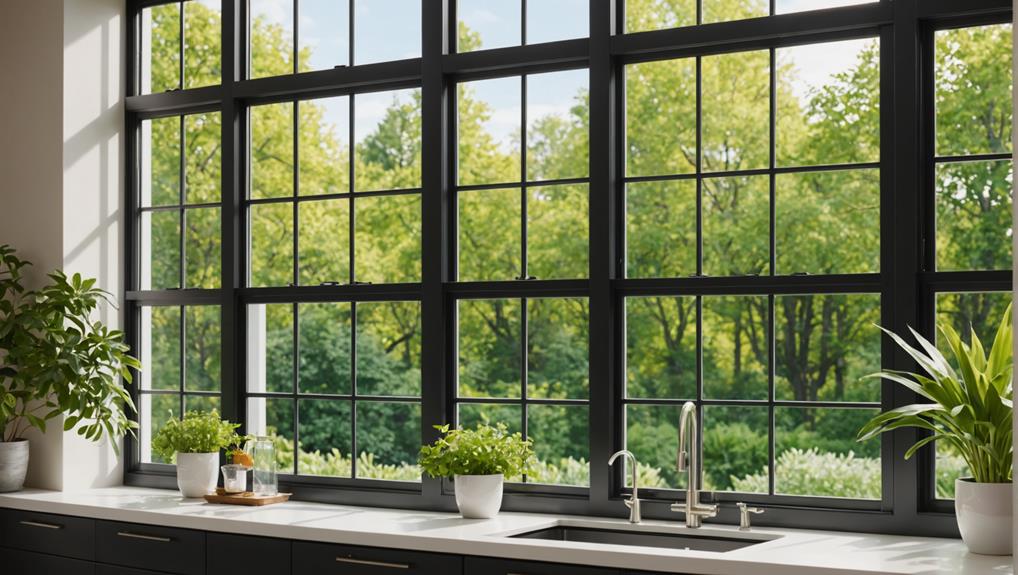
Vinyl windows offer an affordable and durable replacement option, thanks to their construction from polyvinyl chloride (PVC), which makes them resistant to moisture and temperature fluctuations. With a lifespan of over 20 years, you’ll enjoy a low-maintenance solution that requires minimal upkeep compared to wood windows. Regular cleaning is all you need to keep them looking great.
When considering cost, vinyl windows range from $100 to $900, notably more budget-friendly than wood windows, which can run between $150 and $1,300. The insulation properties of insulated vinyl windows improve energy efficiency, helping you save on heating and cooling bills. However, it’s essential to guarantee proper installation, as poorly installed windows can lead to energy loss, regardless of the material.
Customization options for vinyl windows include a variety of colors and styles, though keep in mind they’re not easily painted once installed. Overall, the durability and moisture resistance of vinyl windows make them a smart choice for homeowners seeking a reliable replacement option that balances performance with cost-effectiveness. Feel free to check out our article on cost-effective materials for window replacement.
Overview of Wood Windows
Wood windows bring a timeless appeal and exceptional insulation properties, making them a popular choice for homeowners looking to enhance both aesthetics and energy efficiency. Their natural properties provide excellent insulation, which makes them a more energy-efficient option compared to some vinyl alternatives. However, wood windows do require regular maintenance to prevent issues like rot and insect infestation.
Here’s a visual representation of key aspects of wood windows:
| Feature | Description | Benefits |
|---|---|---|
| Aesthetics | Classic charm, customizable finishes | Enhances home decor |
| Insulation | Excellent thermal performance | Energy-efficient |
| Maintenance | Requires repainting/sealing every 3-5 years | Prevents damage and prolongs life |
| Durability | Can last up to 50 years with proper care | Offers long-term value |
| Material Options | Pine, Douglas fir, cedar with cladding | Enhanced weather resistance |
With proper care, wood windows can provide not just beauty but also long-term value for your home. While the initial investment may be higher, the durability and customization options make wood windows a worthwhile choice for many homeowners.
Cost Comparison
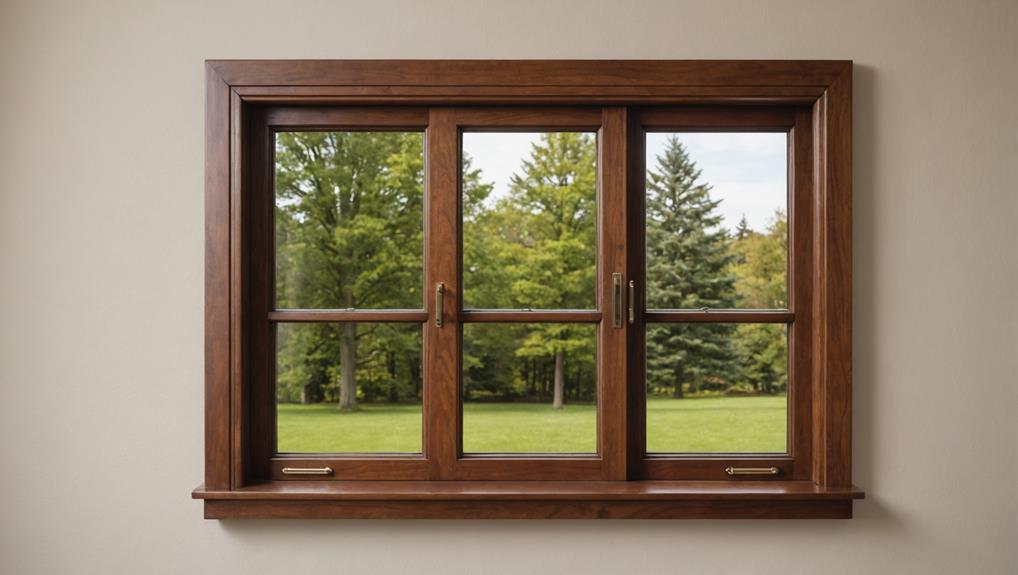
When evaluating window replacement options, you’ll find that vinyl windows generally offer a more affordable solution than their wood counterparts. The cost comparison reveals that vinyl windows range from $210 to $2,000, while wood windows typically cost between $400 and $900. This price difference is significant, especially when factoring in installation costs.
Here are some key points to evaluate:
- Average cost: Vinyl windows average around $20,091 for replacements, compared to $24,376 for wood windows.
- Installation costs: Vinyl windows are lighter and simpler to install, leading to lower labor costs.
- Return on investment: Vinyl windows have an ROI of about 67%, while wood windows show a slightly lower ROI of 61.2%.
- Custom window costs: Custom vinyl windows can range from $400 to $4,000, depending on complexity and size.
Maintenance Requirements
Maintenance requirements differ markedly between vinyl and wood windows, impacting your long-term care and commitment.
Vinyl windows are celebrated for their low maintenance; they only need occasional cleaning to stay in top shape. In contrast, wood windows demand regular repainting or staining every 3-5 years to prevent weather damage.
Wooden frames are particularly vulnerable to rot, warping, and insect damage, so you’ll need to conduct annual condition checks. While repairing damaged vinyl windows can be costly, with repair costs ranging from $300 to $600, wood windows are generally easier and more affordable to fix.
If you want the best of both worlds, consider aluminum-clad wood windows. This option offers a protective layer against weather damage, which can considerably reduce your maintenance needs and prolong the lifespan of the wooden frame underneath.
Durability and Lifespan
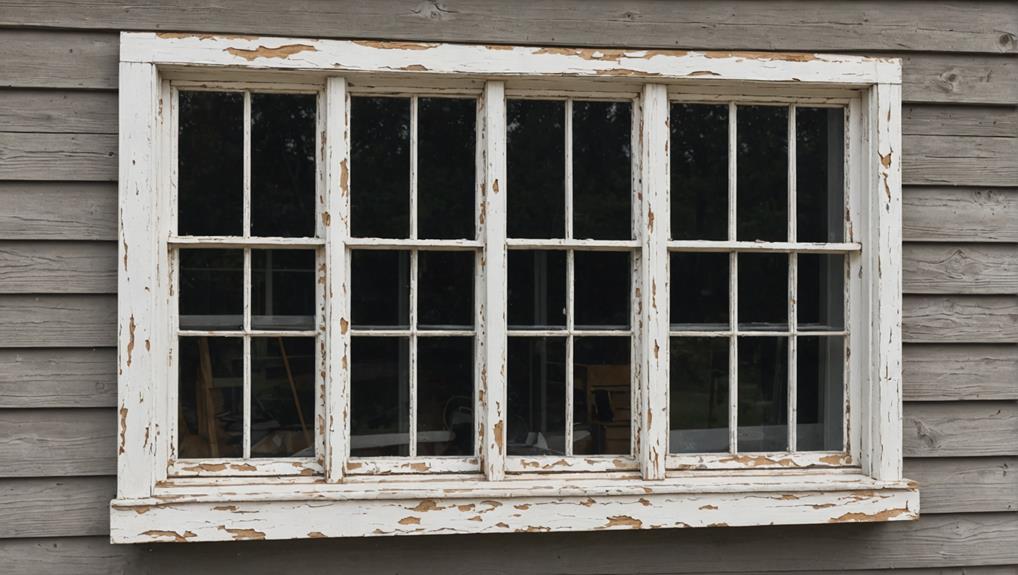
Vinyl windows generally offer a lifespan of 20 to 40 years, while properly maintained wood windows can last up to 50 years, making their durability a key factor in your replacement decision.
When choosing between these options, consider the following:
Maintenance Needs: Wood windows require regular upkeep, like repainting every 3-5 years, to avoid rot and warping.
Moisture Resistance: Vinyl frames resist moisture and insects, enhancing their overall durability.
Warping Risks: Extreme temperatures can cause vinyl to warp or fade, impacting lifespan.
Repair Costs: Vinyl window repairs typically cost between $300 and $600, while wood windows are generally easier and cheaper to fix.
Energy Efficiency: Insulated vinyl windows can boost energy efficiency, though poor installation can negate this benefit for both types.
Energy Efficiency Differences
Energy efficiency varies considerably between wood and vinyl windows, influencing your choice based on long-term savings and comfort.
Wood windows excel in insulation properties thanks to their solid structure, effectively reducing heating and cooling costs. They offer superior thermal performance, which can greatly lower your carbon footprint. Properly maintained wood windows can last up to 50 years, delivering substantial energy savings over time.
On the other hand, insulated vinyl windows can achieve comparable energy efficiency ratings, but their hollow frames may allow for heat transfer if insulation isn’t done correctly. Typically, vinyl windows have a shorter lifespan of around 20 years, which may affect their overall value in the long run.
It’s important to note that the energy efficiency of both types of windows greatly depends on installation quality. Poorly installed windows—regardless of material—can lead to increased energy loss, negating any benefits.
As a result, if you’re focused on maximizing energy efficiency, consider wood windows for their natural insulating properties and longevity. However, if you prefer vinyl, guarantee high-quality insulation and installation to enjoy the best energy efficiency possible.
Aesthetic Appeal and Customization
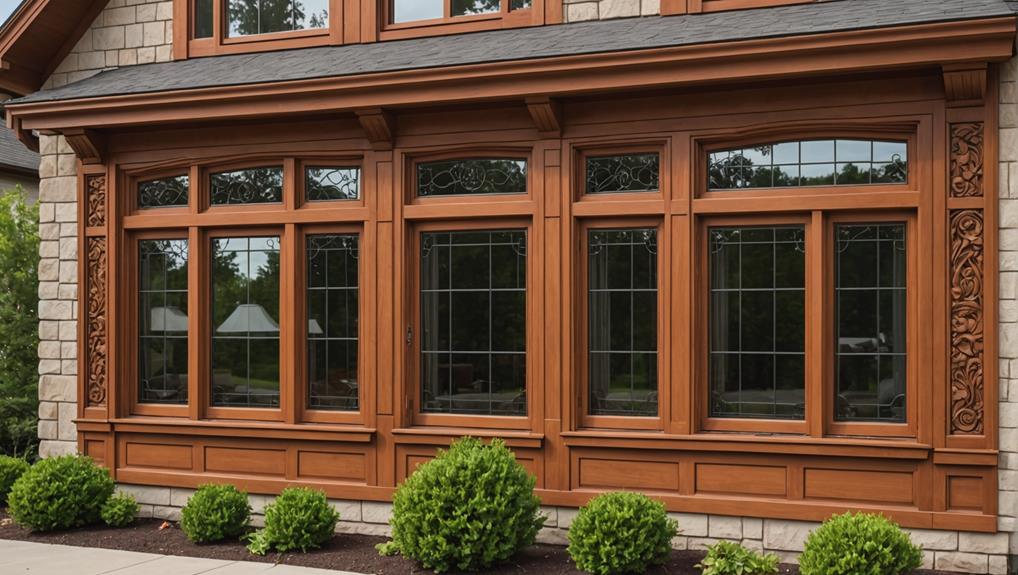
When choosing between wood and vinyl windows, the aesthetic appeal and customization options can greatly influence your decision.
Wood windows are often preferred for their classic, warm, natural appearance. You can easily customize them through painting and staining to match your home’s interior design.
In contrast, vinyl windows offer a modern look but usually come in a limited range of pre-manufactured colors and finishes, which restricts your design options after installation.
Here are some key points to evaluate:
- Aesthetic Appeal: Wood windows provide timeless charm, while vinyl offers a sleek, contemporary vibe.
- Customization: Wood windows allow for extensive customization in designs, sizes, and configurations.
- Natural Appearance: The texture and warmth of wood can enhance traditional or historic homes.
- Standard Shapes: Vinyl windows primarily come in standard shapes, limiting unique designs.
Ultimately, your choice will depend on your style preferences and how much customization you desire. Read more on key comparisons of wood vs. vinyl windows.

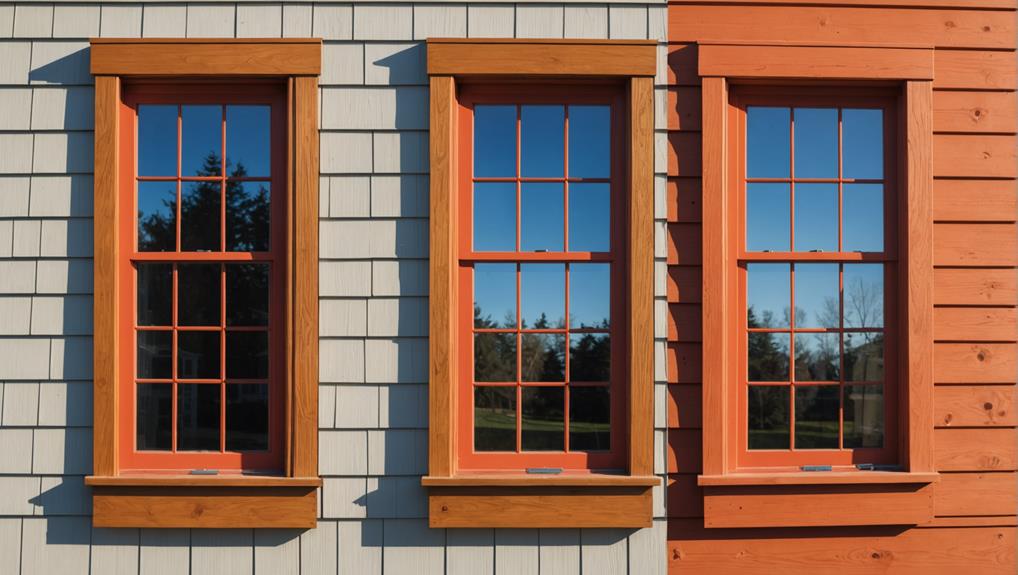
Leave a Reply